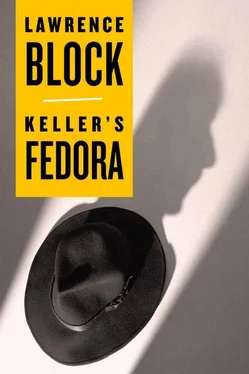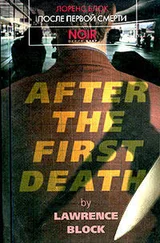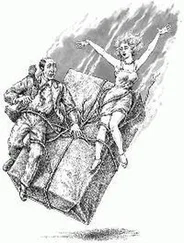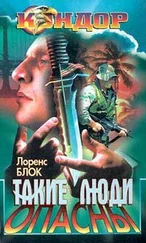Лоуренс Блок - Keller’s Fedora
Здесь есть возможность читать онлайн «Лоуренс Блок - Keller’s Fedora» весь текст электронной книги совершенно бесплатно (целиком полную версию без сокращений). В некоторых случаях можно слушать аудио, скачать через торрент в формате fb2 и присутствует краткое содержание. Год выпуска: 2016, Издательство: LB Productions, Жанр: Криминальный детектив, на английском языке. Описание произведения, (предисловие) а так же отзывы посетителей доступны на портале библиотеки ЛибКат.
- Название:Keller’s Fedora
- Автор:
- Издательство:LB Productions
- Жанр:
- Год:2016
- ISBN:нет данных
- Рейтинг книги:3 / 5. Голосов: 1
-
Избранное:Добавить в избранное
- Отзывы:
-
Ваша оценка:
- 60
- 1
- 2
- 3
- 4
- 5
Keller’s Fedora: краткое содержание, описание и аннотация
Предлагаем к чтению аннотацию, описание, краткое содержание или предисловие (зависит от того, что написал сам автор книги «Keller’s Fedora»). Если вы не нашли необходимую информацию о книге — напишите в комментариях, мы постараемся отыскать её.
Keller’s Fedora — читать онлайн бесплатно полную книгу (весь текст) целиком
Ниже представлен текст книги, разбитый по страницам. Система сохранения места последней прочитанной страницы, позволяет с удобством читать онлайн бесплатно книгу «Keller’s Fedora», без необходимости каждый раз заново искать на чём Вы остановились. Поставьте закладку, и сможете в любой момент перейти на страницу, на которой закончили чтение.
Интервал:
Закладка:
Lawrence Block
Keller’s Fedora
When the salesman asked him his hat size, Keller was stuck for an answer. Some years ago he’d come to New Orleans wearing a Homer Simpson baseball cap, which he’d managed to swap for a Saints cap. Remembering it now, it struck him as curious that a football team would embroider its logo on baseball caps, but he didn’t think it was something he needed to dwell on.
His hat size? Aside from those two baseball caps, neither of which he’d actually picked out and purchased, he couldn’t remember ever having had an actual hat. And baseball caps didn’t come in sizes, did they? Weren’t they all one-size-fits-all, with a little band with holes in it that you loosened or tightened accordingly?
“I’m not sure,” he said.
The salesman, a plump fellow with a mustache trimmed to near-invisibility, cocked his head and narrowed his eyes. “I would say seven and three-eighths,” he said, “and shall we see how close I am?”
He lifted a chocolate-brown fedora from its shelf and presented it to Keller, who placed it on his head. The salesman took hold of the brim, tilted it this way and that way, and stepped back, beaming. “Seven and three-eighths,” he announced. “You could get away with seven and a quarter or seven and a half, but why make do when it’s as easy to have a hat that fits you perfectly? Have a look.”
Keller checked his reflection in the mirror, and there he was, same old Keller, except that he was wearing a hat.
“The classic fedora,” the salesman said. “A true classic with a noble pedigree. The name comes from the title of a play that Victorien Sardou wrote for Sarah Bernhardt in 1882. The divine Sarah played the Princess Fedora and wore a hat quite like yours. And while I don’t doubt she looked spectacular in it, I’d say you’d give her a run for her money. Not everyone can wear a fedora, you know.”
“Oh?”
“It takes a certain je ne sais quoi ,” the man said. “A soupçon of joie de vivre . One must be at ease in a fedora, as you are so clearly at ease in yours.”
Oh, brother, Keller thought. He said, “I was thinking gray.”
“The brown does suit you, but let’s have a look, shall we? Light gray or dark gray? But why not try them both?”
The shop, a haberdashery on Canal Street called Peller and Smythe, had both shades in Keller’s size, and he tried them on in turn. “We also have black,” the salesman said, “but if I may venture an opinion—”
“Not black,” Keller said.
“Exactly. We’re not really the black hat type, are we? And a good thing, I have to say.”
“I think the dark gray,” Keller said.
“And I’d say that’s an excellent choice.”
“My goodness,” Julia said.
“What do you think?”
“The man who went out for a loaf of bread,” she said, “and came back with a hat.”
“Was I supposed to buy bread?”
“No, it was just something to say. But you’re full of surprises. I don’t think I’ve ever seen you wearing a hat.”
“No, probably not. When we’re doing demolition on a job site, Donny and I have a couple of white painter’s caps we’ll put on. Or if we’re painting something, for that matter. But nothing like this. It’s a fedora.”
“Well, I know that.” She adjusted the brim. “You look like somebody I might see in a black-and-white movie on TCM.”
“A private eye?”
“Or a gangster, but you couldn’t look like a gangster.”
“I couldn’t?”
“No,” she said. “You’d have to be the good guy.”
In the morning he had breakfast with Jenny and walked her to school. “I’ll be away for a while,” he told her.
“To buy stamps,” she said.
Most of his trips were to buy stamps, either for his own collection or, increasingly, for resale. This time he hadn’t even packed a pair of tongs, let alone the Scott catalogue he used as a checklist.
“Well, to look at some stamps,” he said. “I don’t know if I’m actually going to buy any.”
He decided on the way home that it bothered him to lie to his daughter, but he couldn’t see a way around it. This would be the first solo trip in a long time that wasn’t philatelic in nature, the first return in a couple of years to a profession he had to keep secret. Julia knew, of course. Julia had known all along, and had even played a role once.
But Jenny knew that he bought and sold stamps, and that he sometimes helped Uncle Donny fix up houses so that they could sell them. That was all she knew, and it would have been inappropriate, not to say upsetting and even dangerous, for her to know more.
Still, it bothered him.
He’d packed the night before, and by the time he got home Julia had already transferred his bag to the back seat of her Audi. He’d been bareheaded when he walked Jenny to school, but the fedora was on his head when he got into the passenger seat and buckled up.
“Ah,” Julia said. “You bought it for your trip.”
“I don’t know why I bought it. I was planning on leaving it home.”
“You’ve evidently changed your mind.”
“I could still leave it in the car,” he said.
But he didn’t. She dropped him at the Amtrak station on Loyola, and he took off his hat to kiss her goodbye, and then put it back on again.
Inside, with his ticket already purchased in advance and two hours before his train was scheduled to depart, he bought a Times-Picayune and a cup of coffee and skimmed one while he sipped at the other. The coffee was all right — trust New Orleans to have acceptable coffee even in a train station — but the paper didn’t hold his interest, and eventually he drifted back to the newsstand and browsed the rack of paperbacks.
Fully half the titles on display seemed to be by the same two writers, each of whom collaborated with a whole stable of co-writers. Keller wondered what would happen if the two main guys should merge, through some sort of stock swap. They’d be a good bet to lock up every train and airport outlet in America, but could they get away with it? Would they run up against the Sherman Anti-Trust Act?
One book, by neither of the two, caught his eye, because for a half-second he thought it had his picture on the cover. Of course it wasn’t his picture, the guy on the cover didn’t look anything like Keller, but he was wearing Keller’s hat, a dark gray fedora that looked exactly like the one on Keller’s head.
Well, almost. The one on the cover had a bullet hole in the crown, with wisps of smoke suggesting it had been recently bestowed. If the near miss bothered the hat’s wearer, you couldn’t tell it by the expression of grim determination that he wore as easily as he wore the hat.
Call Him Jake was the book’s title, and the publisher wanted you to know that it was the first volume in the Jake Dagger series. But it was the blurb that made Keller carry the book to the register and pay cash for it.
“He’s a private eye. His life is booze, babes, and bullets.”
The train was the City of New Orleans, and once in a while you still heard Arlo Guthrie’s song about it. It left on time, a little before two, and was due in Chicago at nine the next morning. Keller had booked a roomette, and once he was settled in he took out his book and read a few pages.
Years ago, when he’d lived on the East Side of Manhattan a few blocks from the UN, a job had taken him clear across the country to Wyoming. He’d flown there and back, of course, and the state’s population was lower for his having gone there, but what he remembered best was the book he bought before his flight.
Well, not the book. All he recalled of it was its blurb, and he remembered that much word for word: “He rode a thousand miles to kill a man he’d never met.”
Читать дальшеИнтервал:
Закладка:
Похожие книги на «Keller’s Fedora»
Представляем Вашему вниманию похожие книги на «Keller’s Fedora» списком для выбора. Мы отобрали схожую по названию и смыслу литературу в надежде предоставить читателям больше вариантов отыскать новые, интересные, ещё непрочитанные произведения.
Обсуждение, отзывы о книге «Keller’s Fedora» и просто собственные мнения читателей. Оставьте ваши комментарии, напишите, что Вы думаете о произведении, его смысле или главных героях. Укажите что конкретно понравилось, а что нет, и почему Вы так считаете.







